Top 15 Places to See in Genoa Italy (2025 Guide)

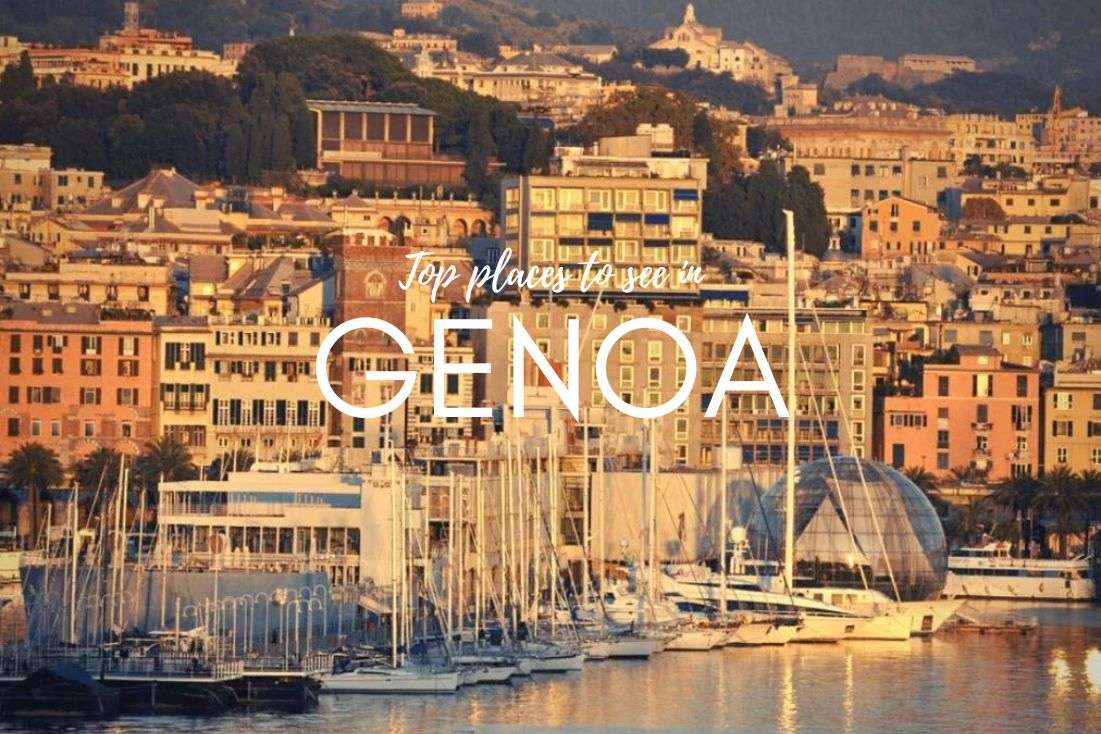
Genoa, Italy - often overshadowed by Italy’s more famous cities—is a hidden gem on the Ligurian coast. Whether you're visiting for a day or staying longer, the city is filled with history, stunning architecture, and unforgettable views. Here are 15 places you absolutely can’t miss in Genoa.
- 1. Piazza De Ferrari
- 2. San Lorenzo Cathedral
- 3. Cimitero Monumentale di Staglieno
- 4. Christopher Columbus’ birth house
- 5. Palazzo Ducale
- 6. Palazzo Reale
- 7. Palazzi dei Rolli & Strade Nuova
- 8. Porto Antico
- 9. Maritime Museum (Galata Museo del Mare)
- 10. Genoa Aquarium
- 11. Porta Soprana
- 12. Boccadasse
- 13. Passeggiata Anita Garibaldi a Nervi
- 14. La Lanterna di Genova
- 15. Spianata di Castelletto
Why You Should Visit Genoa (Even If You Think It’s Just Another Port City)
Genoa (or Genova if you're feeling Italian) is Italy’s largest port city—and it shows. Grandiose palaces? Check. Ancient harbors? Absolutely. Narrow streets that look like they haven’t been dusted since the 1600s? Yep, those too. It's not exactly Rome or Venice when it comes to tourist hype, but that's what makes it interesting. Genoa is gritty, historic, and surprisingly full of things to see—if you know where to look. Here’s your ultimate list of the top 15 places to visit in Genoa, Italy (aka the stuff actually worth your time).
You might also be interested in reading about other Northern Italy itineraries:
- Cinque Terre Itinerary for 2 Days: A Perfect Weekend Trip
- Travel Tips for Italy: 10 Things to Know Before You Go
- What to See in Bologna in One Day
- One Day Itinerary for Ravenna
- What to Do in Turin: 9 + 1 Places to Visit
Top Attractions and Things to See in Genoa
1. Piazza de Ferrari – Start in the Center of Genoa
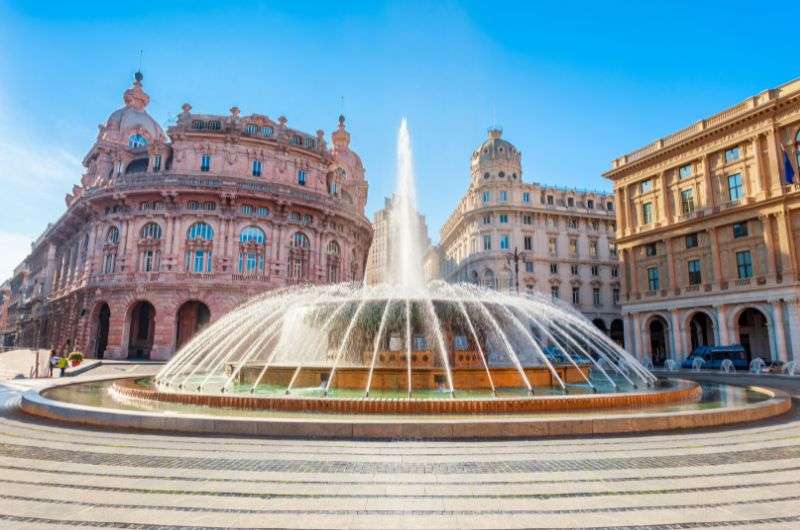
Majestic!
Why It’s Worth Visiting:
This is Genoa’s main square and a good place to start. Located between the Old Town and the modern business district, it's home to that big ornate fountain you’ve probably seen on Instagram. The buildings surrounding it are… fine. Great photo ops. The “GENOA” sign is there if you're feeling touristy. Now move on.
A huge ornate fountain is the crown jewel of the square. Boring, I know, but it’s a good starting point for exploring the Old Town. I liked this square, but check the Piazza San Carlo in Turin. Turin is my favorite city in Italy, and I’ve written a separate article about it.
2. San Lorenzo Cathedral: A Masterpiece of Genoese Architecture
Why It’s Worth Visiting:
Cattedrale di San Lorenzo is the greatest cathedral in Genoa and arguably the most interesting one. Located just a street away from the Ferrari square, you can easily recognize it by its zebra-striped façade, made of white marble and black shale. Quite impressive. The façade was finished in the 14th century, but the cathedral itself is a reconstruction of an even older Roman basilica.
In the cathedral’s sacristy, you can visit the Museo del Tesoro, which guards several holy relics. A glass goblet passed on as the Holy Grail, Salome’s quartz platter (without John the Baptist’s head), and a fragment of the True Cross. I’m sure all of them are authentic (imagine an ironic tone) as well as the “one true Torino Shroud”.
Quick Tip: Visit the Museo del Tesoro inside the cathedral to view relics like the Holy Grail (though I’d take that claim with a pinch of salt).
3. Cimitero Monumentale di Staglieno – The Most Artistic Cemetery Ever
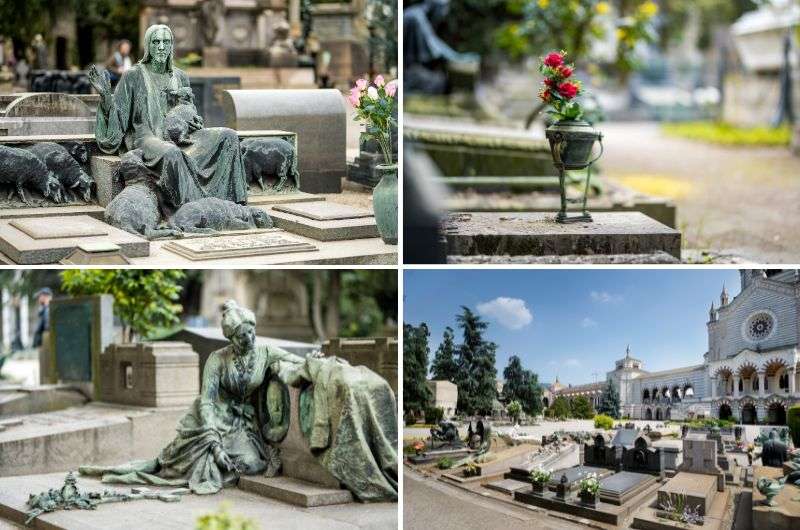
This cemetery was an inspiration for Nietzsche
Why It’s Worth Visiting:
It may seem odd to include a cemetery on a list of must-see places, but Cimitero Monumentale di Staglieno is renowned for its exceptional sculptures, monuments, and rich artistic history. Inspired by the works of Nietzsche, it’s a hauntingly beautiful site that feels like an open-air museum.
Does it sound strange to you to visit a cemetery as a point of interest? It did to me. Well, it’s Italy! Anything is possible there. This particular cemetery was created in the 1800s and contains a wide range of artistic sculptures, statues, monuments, and even arched walkways and porticoes. Each one of the gravestones is a piece of art.
So in this case, it's more like walking through the stone art collection... with a Walking Dead twist. And hey, if Nietzsche was inspired by this, there must be something about it!
Quick Tip: The cemetery is located on a hill, so be prepared for a bit of a walk.
4. Christopher Columbus’ Birthplace – Kind of a Letdown, but Historic
Why It’s Worth Visiting:
It may come as a surprise, but the great navigator and explorer Christopher Columbus was born in Genoa. An ancient house still stands to this day. Well, more or less. Since the attack of the French troops in the 17th century, it’s mostly a ruin. For 3 EUR (2.55 GBP / 3.40 USD), it’s possible to visit the two rooms inside, dedicated to Columbus’ life. However, it’s like 5 minutes matter, so I just took a photo from outside and moved to another site.
As a big fan of "Age of Discovery", more like a "rediscovery" hero, I just had to visit his birthplace. Well, I saw his Tomb in Sevilla, so the circle closes at last.
Quick Tip: It’s a short visit (5-10 minutes) but perfect for history buffs looking to tick off another landmark.
5. Palazzo Ducale - Genoa’s Political Bling from the Past
On the corner of the Piazza de Ferrari stands the grandiose Palazzo Ducale from the 13th century. Formerly the seat of the Genoa Doge (head of the independent Republic of Genoa), restored after the great fire in 1777, is now the center of culture. Therefore, the best way to see it all is by visiting some of the prestigious art exhibitions or cultural events.
Quick Tip: Check the schedule for temporary exhibitions, as this venue is always buzzing with cultural activity.
6. Palazzo Reale – Frescoes, Chandeliers, and All That Jazz
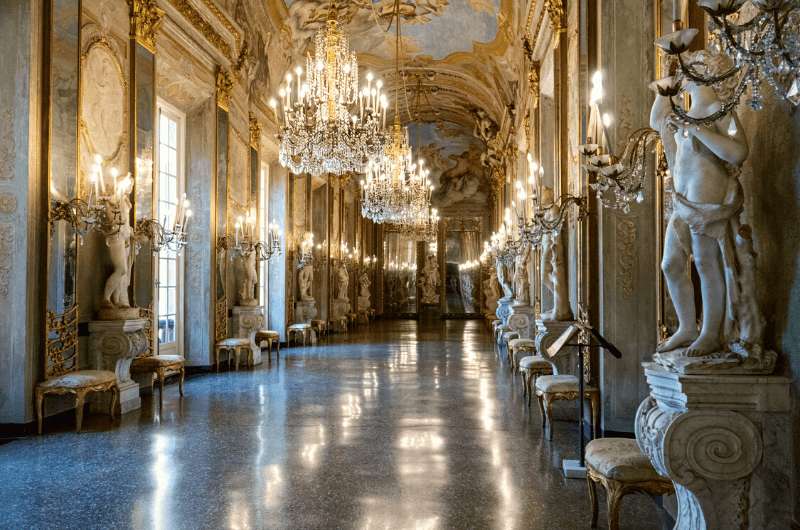
Image Source: Museo di Palazzo Reale, Genova
The Royal Palace is something for art lovers. On every step, there’s a stucco decoration, a fresco masterpiece, a sophisticated statue, or a painting made by some utterly important painter. Once the splendorous home of a Savoy royal family, now one of the most popular tourist attractions in Genoa and is surely worth a visit if you’re an art enthusiast. You should see the ballroom…
Quick Tip: Spend some time in the royal gardens for spectacular views over the city.
7. Palazzi dei Rolli & Strade Nuova – UNESCO and Noble Vibes
The Genoa UNESCO World Heritage highlight, 42 grand 16th-century residences on the Via Garibaldi and Via Balbi streets that form a spectacular noble district called Strade Nuova. Most of the palaces were built for insanely rich Genoa’s families, showing off the wealth of the Republic of Genova. Perhaps the most famous and opulent are Palazzo Bianco, Palazzo Rosso, and Palazzo Tursi, which are open to the public.
Our tips for Genoa:
- Where to stay: Marina Place Resort (8.8 ⭐️)
- Where to eat: Le Rune | Trattoria Rosmarino | Cucina Valoria
- Save money with Genoa’s Museum Card
Read my 10 travel tips for Italy you should know before you go.
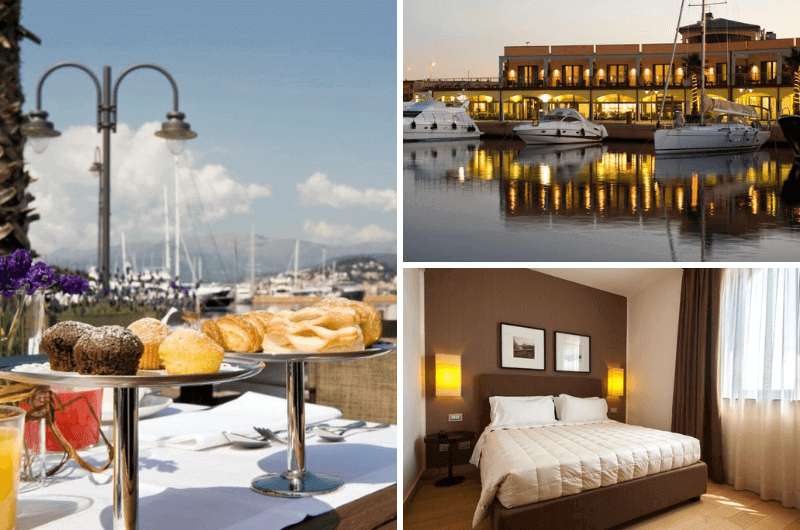
Marina Place Resort was definitely a good choice!
We’ve stayed at Hotel Marina Place Resort and I would definitely choose this one again. Besides the excellent breakfast, big cosy rooms, big free parking, and free upgrades, it’s in a great location with very good restaurants nearby.
It cost us around USD 210 per night, and it was absolutely worth it.
Just fyi, if you book a hotel in Italy (or anywhere else) through our booking.com affiliate links, we’ll get a small (like, really small) commission at no extra cost to you. Thank you so much! We’ve sprinkled hotel tips throughout this article.
8. Porto Antico – From Abandoned Harbor to Tourist Magnet
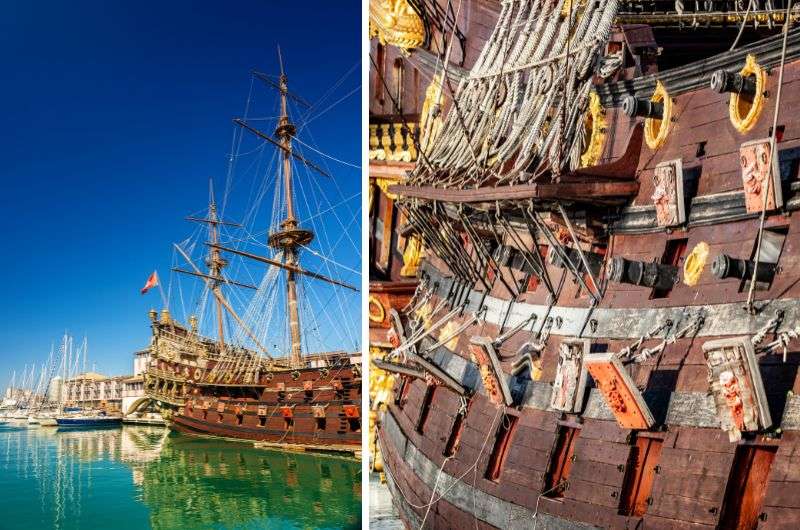
The historic Neptune Galleon
Genoa is the largest harbor in Italy, and if it were not for Marseille, it would be the largest Mediterranean harbor. With a naval history dating back to the 12th century, visiting the Genovese old harbor is one of the mandatory things to do in Genoa. It was abandoned for a long time until the local enthusiasts decided to save it and made a vibrant entertainment complex.
The festive grand opening took place in 1992 on the 500th anniversary of the discovery of America. Today, the harbor is a modern venue with cafés and restaurants and lots of attractions.
Panoramic Lift “Bigo”
The modern 40-meter iconic lift offers a circular view of the old town on one side and the waterfront on the other. The shape of the lift is supposed to resemble an old crane unloading goods from the ships.
I don’t know how about you, but I’ve never seen the old crane unloading ships, so to me it just looked like a giant iron octopus. The lift operates every ten minutes, and it costs 5 EUR (4.20 GBP / 5.7 USD).
Biosphere
The unique glass and steel ball construction from 2001 is home to more than 150 fauna and flora. It’s basically a big tropical greenhouse, where you walk among the palms, birds, and butterflies. Nice touch to the modern harbor.
The separate ticket is for 5 EUR (4.20 GBP / 5.7 USD) as well. If you buy the combined ticket to the Aquarium, the Bigo, and the Biosphere, it’s a bit cheaper.
Neptun
A replica of a 17th-century Spanish galleon was originally made for Roman Polanski’s film Pirates. Although it looks like a real Spanish galleon on the outside, it has a modern motor, and the hull is made from steel.
However, it’s cool and accessible to explore: 6 EUR (5 GBP / 7 USD) for adults and 4 EUR (3.40 GBP / 4.50 USD) for kids. There’s not much to see inside, so unless you have small kids, I think it’s enough to take a pretty picture from outside.
9. Maritime Museum (Galata Museo del Mare)
I had high expectations for this one. And guess what… it was really lame. In the Galata Museum, you’ll find tons of paintings, tons of texts, no ship models (if I don’t count the teeny tiny models, okay, one lame model).
The only cool thing (a real-life submarine) is cleverly seated outside the museum to lure you in for a visit. If you’re planning on taking your kids there, don’t.
The huge galleon outside and the Aquarium will be a better choice. Maybe I was so disappointed before I had been in the one in Venice before, and it was much much much better. I spent 6 hours in there, totally blown away. In Genoa, it took me about an hour.
By the way, when you hear the word “Italy”, one thing that probably comes to your mind straight away is Italian cooking. I’ve dedicated an article specifically to Italian food.
10. Genoa Aquarium – Sharks, Manatees, and Virtual Dolphin Time

I mean...just look at them! They’re awesome!
After the Cape Town Aquarium, this was the second-best. It’s the largest Aquarium in Europe with more than 600 species. My favorite—manatees, dolphins, seals, and of course, sharks.
The Genoa Aquarium has several exhibits offering multiple experiences, including virtual reality and skate petting. Who would say no to that? Anyway, it’s approximately a 2-3 hour visit, unless you’re with kids, then it can be a never-ending visit.
5 Additional Photo Spots for Perfect Instagram Pictures:
And because I’m a super-nice person, I will also disclose the best 5 photo spots in Genoa you must visit, if only for the view.
1. Porta Soprana
The ancient city gate is not only an impressive structure, but you can also climb up and enjoy the view from there (for free!). It was a part of the 12th-century defensive fortification, also serving as a main entrance to the city.
Sometimes it’s called the Barbarossa gates/walls, as it was primarily built to defend the city against Frederick Barbarossa (the Holy Roman Emperor and the King of Italy). You can spot a small plague on the gate.
In case you’re wondering what’s written there, I was too. I did a little research, but the only thing I found was that “only those who come in peace can touch the gate”. Well, I anticipated something more mysterious and interesting. Never mind, maybe next time.
2. Boccadasse
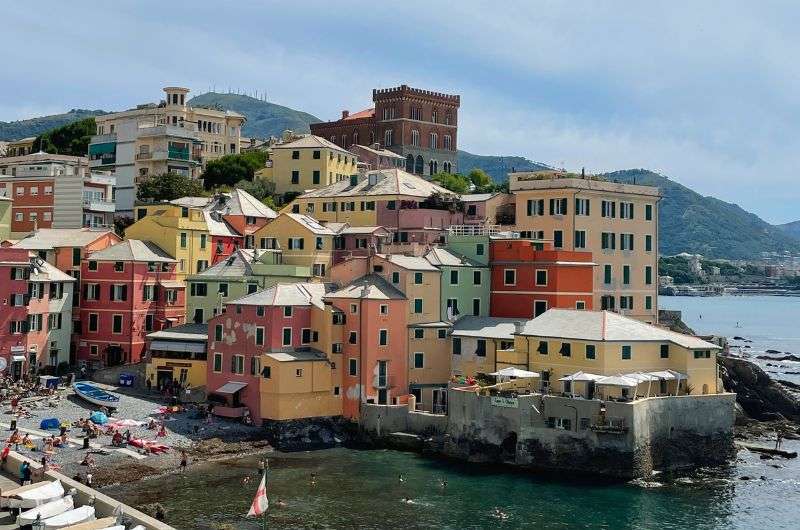
The colorful Boccadasse
If you plan your trip to Genoa for more than one day, act like a Genovese and take an evening stroll along the seashore on the Corso Italia promenade. It starts a few kilometers outside the city center, so you can either walk there or take bus 31 from Piazza di Ferrari to Punta Vagno.
The 2.5 km-long (1.5 mi) promenade takes you to Bocadesse, a former fishing village, now a popular tourist attraction. It looks like a part of Cinque Terre; you just don’t have to fight the crowds and the train schedule (if you don’t know what I mean, read my guide to Cinque Terre and you’ll understand).
There are several beaches along the way, including the one in Boccadasse, as well as stunning photo spots.
Tip: There are not many parking spaces, so I recommend using public transport on this one. Bus 31 leaves every 15 minutes and connects the Genoa City center directly with Bocadasse.
Another Quick Tip: Take a walk along the Corso Italia promenade to enjoy beautiful views of the coastline.
You know where else you can find beautiful views? In Lombardy, I've written a separate article about it. Check it out!
3. Passeggiata Anita Garibaldi – The Prettiest Walk Near Genoa
A little bit further behind the Bocadasse lies another small village called Nervi. Another former fishing village (what else would you do there in the 19th century?) is now home to an extensive park area with a botanical garden and modern art gallery. The heart of the village is still the little port with its bars, cafés, and restaurants. The port is the starting point for the Passeggiata Anita Garibaldi, a seaside promenade with many beautiful views and spots for bathing.
4. La Lanterna - Genoa’s Towering Old Lighthouse
One of the biggest points of pride among the Genovese is their ancient lighthouse. Originally part of a medieval fortification is one of the oldest lighthouses in the world! The tower is believed to be 800 years old. In the following centuries, the building got bigger, and they even had a jail in there.
Today, the lighthouse stands in the middle of the modern industrial harbor, providing a different perspective. You can see the bustling new harbor on one side and the Porto Antico with the city roofs on the other.
Quick Tip: Climb to the top for an unforgettable panoramic view of Genoa and its coastline.
5. Spianata di Castelletto – The Viewpoint You Didn’t Know You Needed
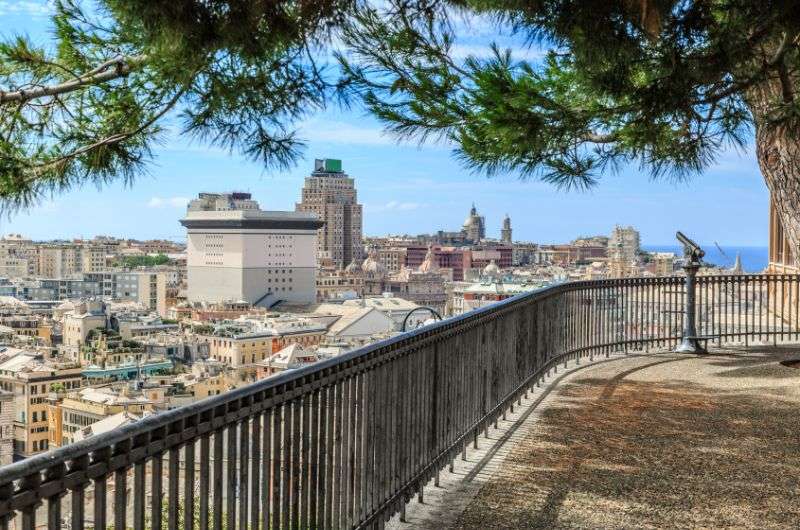
Epic view of Spianata di Castelletto
Spianata di Castelletto is a historical landmark on a hill, yet still within the city walls. From the 13th century, there was a Castelletto fortress looking down on the city, however, it was torn down in the 1850s. One way to get to the top is a special lift, operating since 1910, which will take you right to the Belvedere Luigi Montaldo—the very best place to enjoy the city views at any time of the day.
It was cool to use the hundred-year-old lift, but if you want to climb up yourself, many steps leading uphill.
Before you travel to Italy, you might find useful my article about travel tips for Italy.
Final Thoughts on Visiting Genoa, Italy
Genoa (Genova) might not be the first place that comes to mind when you think “Italy vacation,” but that’s exactly why you should go. It’s raw, real, and ridiculously photogenic—if you know where to look.
So now that you know the top places to see in Genoa, pack your walking shoes, prepare for pesto, and skip the Maritime Museum unless you’re really, really into boats.
Our tips for Genoa:
- Where to stay: Marina Place Resort (8.8 ⭐️)
- Where to eat: Le Rune | Trattoria Rosmarino | Cucina Valoria
- Save money with Genoa’s Museum Card
Is Genoa worth visiting?
Yes. No. Kind of. It really depends on what you’re after. If you expect Venice-like beauty or Florence-level culture, you’ll probably be mildly disappointed. Genoa is gritty, a bit chaotic, and full of contrasts. But if you like grand palaces, narrow alleys that feel like a maze from Assassin’s Creed, and a serious lack of tourists compared to Rome—then yes, Genoa is very much worth visiting.
How many days should I spend in Genoa?
One is enough if you’re efficient. Two if you actually want to enjoy it without running around like a caffeinated squirrel. Spend a day exploring the Old Town, Porto Antico, and the major palaces. If you’ve got more time, add Boccadasse or Nervi for the coastal vibes. Or just get lost in the alleys and pretend you’re a local who’s terribly bad with directions.
What is Genoa known for?
Three things: pesto, Columbus, and being Italy’s largest port city. Oh, and confusing tourists who thought they were booking a trip to Geneva. You’ll hear about Genovese pesto at least 40 times during your stay, so you might as well eat it in every form possible. Genoa is also home to grand palaces, a medieval lighthouse, and a cemetery so cool Nietzsche got inspired there. So yes, it’s got range.
This post may contain affiliate links. We earn a small commission if you make bookings through my links, at no additional cost to you. This helps us keep this blog free, thank you!


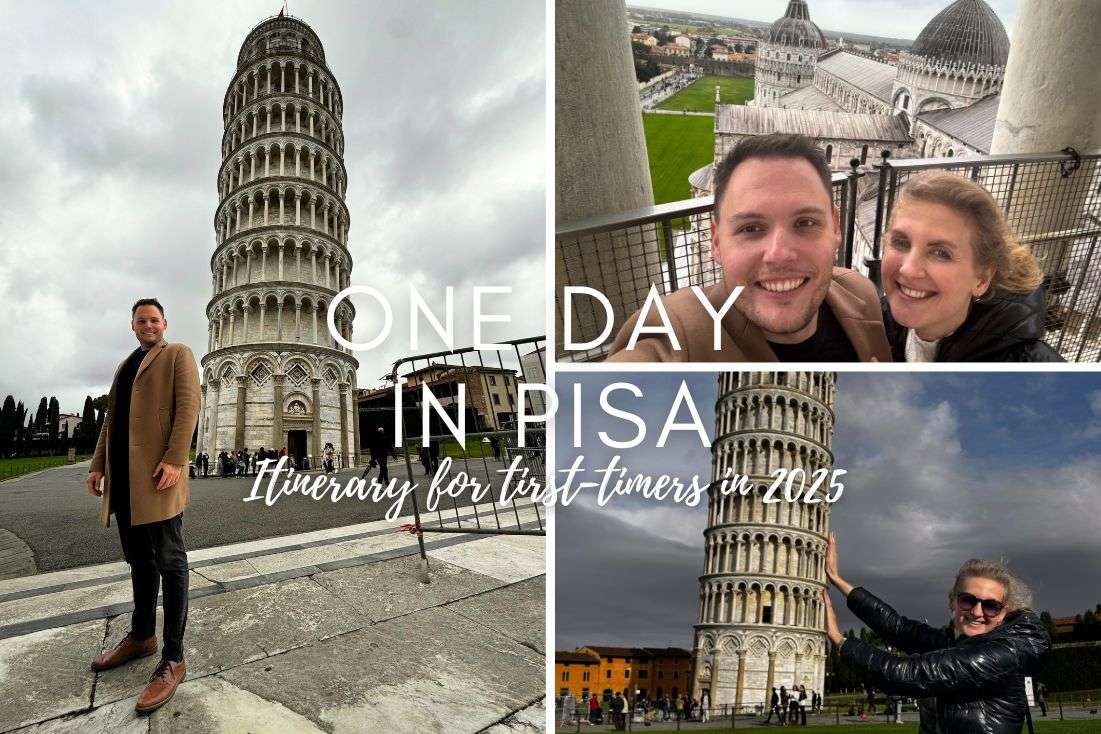
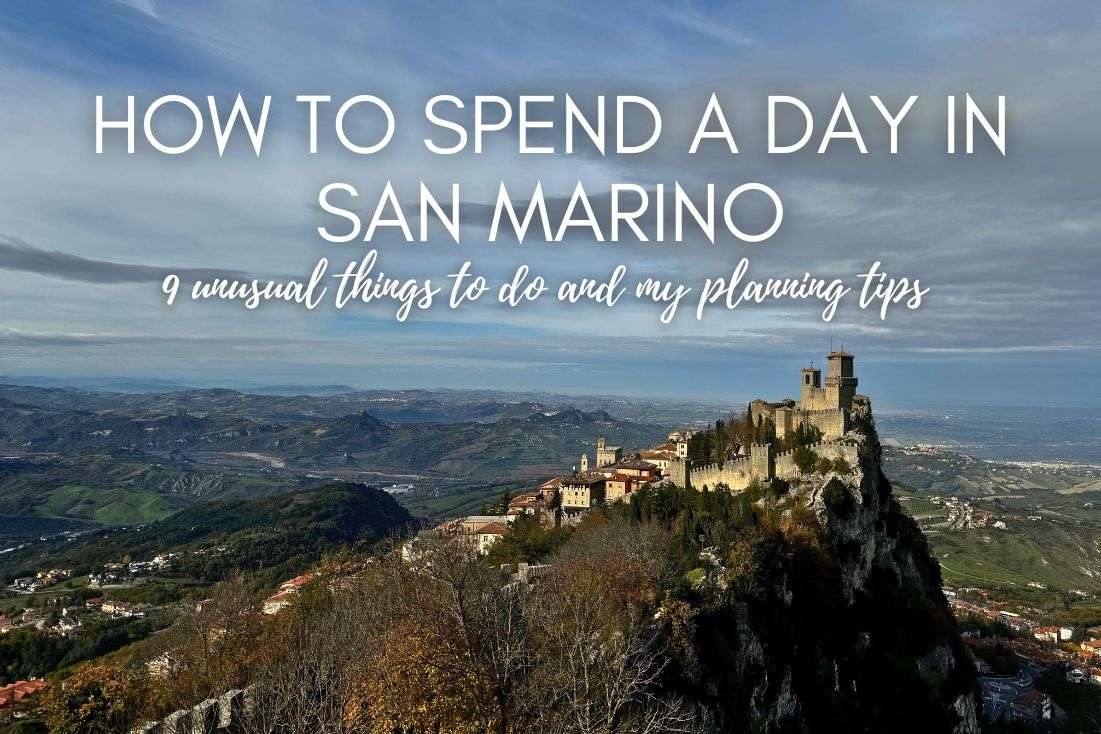
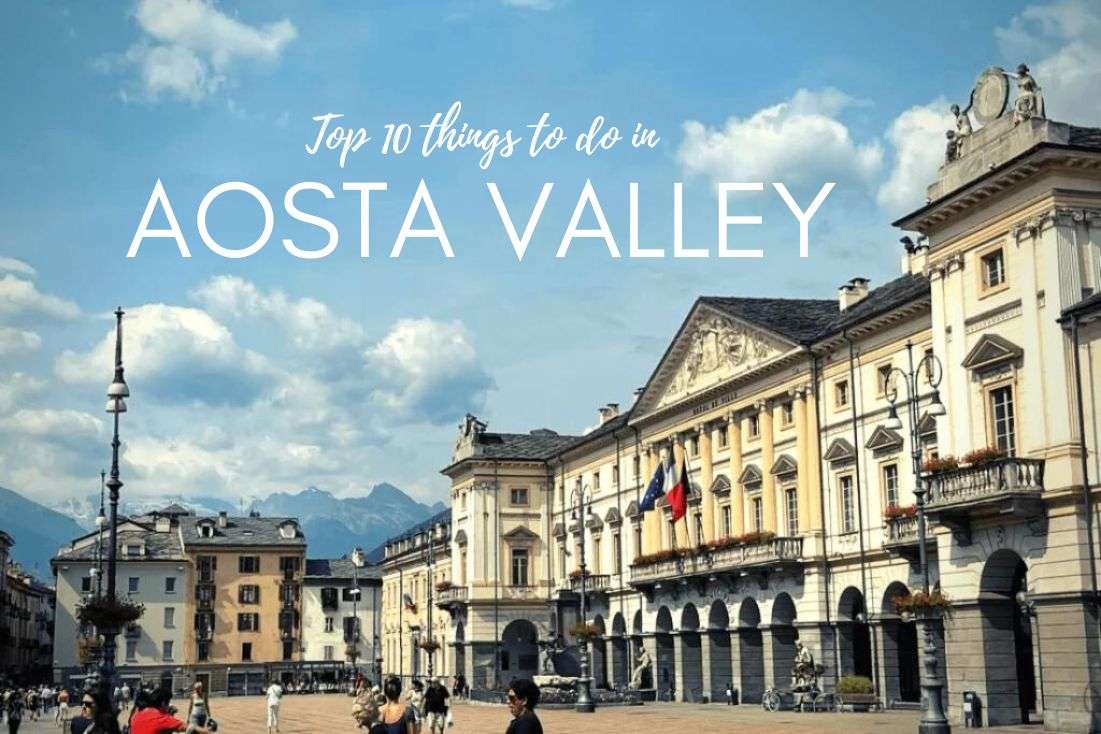





Comments | Thoughts? Give us a shout!